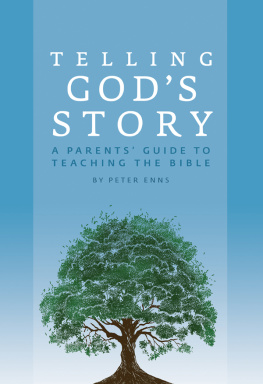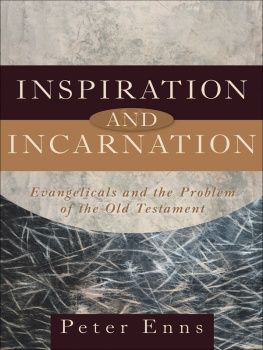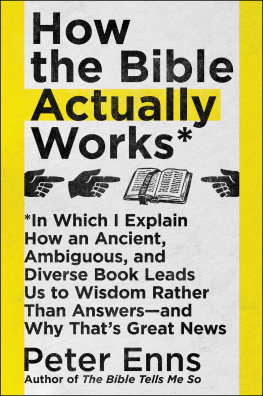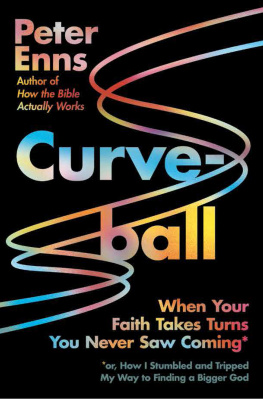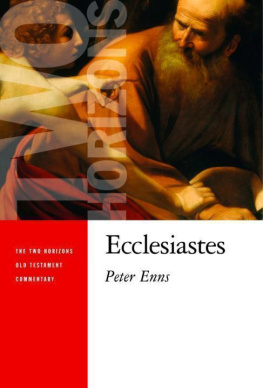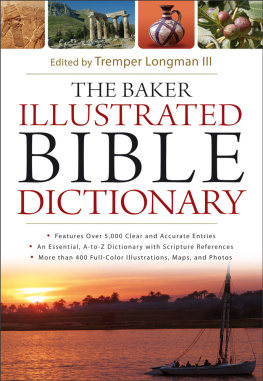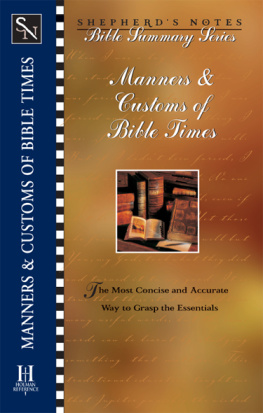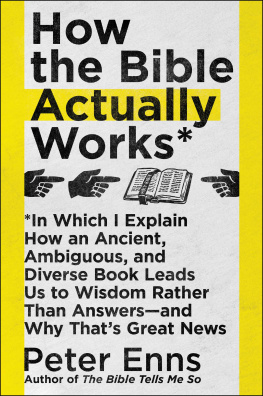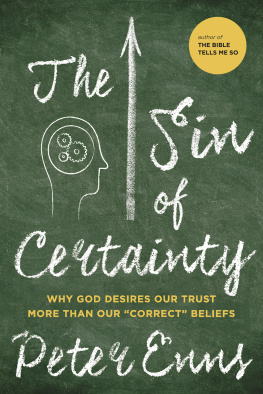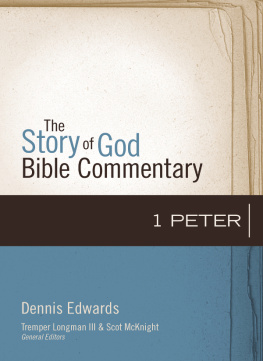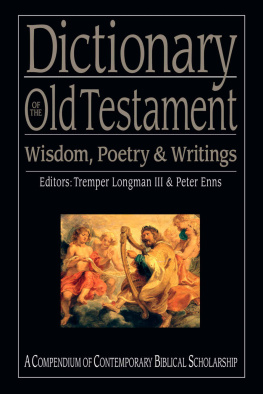
T ELLING G ODS S TORY
A P ARENTS G UIDE TO T EACHING THE B IBLE
P ETER E NNS

For Sue
Mother, Teacher, Fellow Pilgrim

For Erich, Elizabeth, and Sophie
Still on the journey
TABLE OF CONTENTS
T his book introduces parents and teachers to a new philosophy of teaching the Bible. My intent is to give you an overall vision for what the Bible is (and is not), and what it means to read and understand it. My goal is that this will help you teach the Bible faithfully, powerfully, and with joy to your children.
It has been my experience, as a biblical scholar, seminary professor, and parent of three nearly adult childrenwhom my wife, Sue, homeschooled for part of their secondary school educationthat there is a big gap between what children tend to learn about the Bible in the early years, and how Scripture is studied in later years, as children mature into adults. For this reason, I have felt for many years that a different approach to the Bible is needed.
In this introductory volume to studying the Bible, I propose focusing on what the Bible as a whole is about, rather than zeroing in on individual Bible stories or snippets of moral teaching taken out of context. This approach introduces young students to the big picture, encouraging them to understand the entire biblical storyas, I believe, it is intended to be understood.
The goal for this kind of approach is to prepare young Christians to have a vibrant faith in God and trust in Scripture in a world that is changing more quickly than we can describe. The chapters that follow will address these two main issues, and others, in more detail.
Telling Gods Story stands on its own, as a proposal for a thoughtful, thorough approach to teaching the Bible. But it also acts as the introductory volume for a fully developed curriculum, complete with scripted lessons, activities, and lesson plans. For more on the Telling Gods Story curriculum, visit olivebranchbooks.net.
I hope that the pattern laid out here will help you develop a real sense of purpose and excitement at the prospect of teaching your children the Christian faith to which our Scripture bears witness. Gods word is meant to be taught by faithful parents (Deuteronomy 6:49; Proverbs 1:8; 2 Timothy 1:5). This book is intended to aid in that process.
Pete Enns, PhD
Lansdale, PA
T hroughout their teenage years, all three of my children have had issues with keeping their rooms even remotely presentable. (One child in particular comes to mind. You know who you are.)
As any parent of teenagers can attest, the dialogue is predictable: I cant see the floor. You need dynamite to get from one end of the room to the other. How can you live in this mess? I could torch half the clothes on the floor and you wouldnt even miss them. You kids today; when I was your age.
This has been going on for years, and it gets us nowhere.
Finally, the child with the particular issue and I decided that the main reason for the mess was that there was no good place for organizing clothes. I suddenly saw a ray of hope. I grabbed my keys, hopped in the car, and bought a closet organizing system (a bit pricey, but in times of crisis money is no object). I had it up in two hours, and now my family is living happily ever after (until the next crisis emerges).
For many parents, the Bible looks a little bit like my childs room. Its a mess. Names, places, events are all over the place, and you hardly know where to start cleaning up. Its such a mess, in fact, that if someone ripped twenty pages out of Leviticus or 1 Chronicles, you might not even notice it was missing. And if your aim is to teach the Bible to your children, the mess isnt just confusing. Its stressful.
This book is for parents who want to do a good job with the important but daunting task of teaching the Bible. And just like the airplane oxygen mask that youre supposed to put on yourself first before you put it on your children, this book is first and foremost about you.
Take a step back from the thought of teaching your children and focus on yourself for a moment. This is very important, for how you see the Bible will influence your children as much as any curriculum.
Think about your own history of reading Scripture. For example, have you ever tried reading the Bible through from beginning to end (maybe as part of a Bible in a year reading program of some sort)?
It is January 1, and you are determined to make a go of it. But its difficult. You start out with the best of intentions, and things coast along well enough for a while. Genesis is pretty interesting, even though it is fifty chapters long. The Joseph story is nice: sexual intrigue, a little spying.
If you make it through Genesis, youve done well and so you begin with Exodus. This is often easier because nearly everyone has seen Charlton Heston portray Moses for half a century now. The special effects are missing from the biblical version (in fact, a fair amount of the movie is nowhere to be found in the pages of Exodus), but you are familiar with the story line and everything is fine until you get to about chapter 20 and start reading all about laws. The Ten Commandments come first. But after the Ten Commandments, chapters 2123 are filled with the strangest laws, about bulls, property lines, servantsnot the kinds of things you build your morning devotions around, and certainly not the kinds of things that make sense in the modern West. And how in the world are you supposed to teach this to ten-year-olds?
Then you come to chapter after chapter about the building of the tabernacle. In fact, Exodus 2540 is all about the tabernacle, with the exception of the golden calf incident in chapters 3233, which at least introduces some action to the book.
If by some Herculean feat you make it through Exodus, you have to wade through Leviticus, where you hit a brick wall: chapter after chapter of what to sacrifice and when, plus some very strange topics (like how to get rid of mildew). Obviously, you and the Old Testament Israelites breathe a different air. What should you make of all this? And what, if anything, should you teach to your children?
Succumbing to temptation, you skip over to the Psalms (just for a break; Ill get back to Leviticus). They seem so nice and uplifting.
Psalm 1: the righteous prosper, the wicked are punished. So far so good. Psalm 2: Gods son (i.e., King David) is on the throne. Not sure what that means, but it sounds like good news.
Then you hit Psalms 3, 4, 5, 6, 7, 8, 9. You dont make it out of the teens before the Psalms all start looking the same. You become discouraged, and maybe flip over to Proverbs, but here too: so many sayings, and they all start looking alike. And thirty-one chapters! By this time, its probably close to spring, so it makes perfect sense to just skip over to the Gospels and forget the rest of the Old Testament. Its almost Easter anyway.
I dont mean to make light of our struggles to understand the Bible, but this is a very common phenomenon among Christians today. The Old Testament is particularly tough to wade through. And as a result the Old Testament, which makes up about 4/5 of our Bible, is something many of us end up avoiding.
Our difficulties with the Old Testament bleed over into our efforts to understand the New. The New Testament is the climax of a grand story, one that begins in the Old Testament, and it echoes back to the Old Testament many, many times. There are about 265 Old Testament passages cited in the New Testament, and some of those are cited more than oncewhich means that the Old Testament appears over 350 times in the New. Thats a lot. My Thinline NIV New Testament is about 265 pages longwhich means that theres an average of about 1 1/3 Old Testament citations on each page of the New Testament.
Next page
